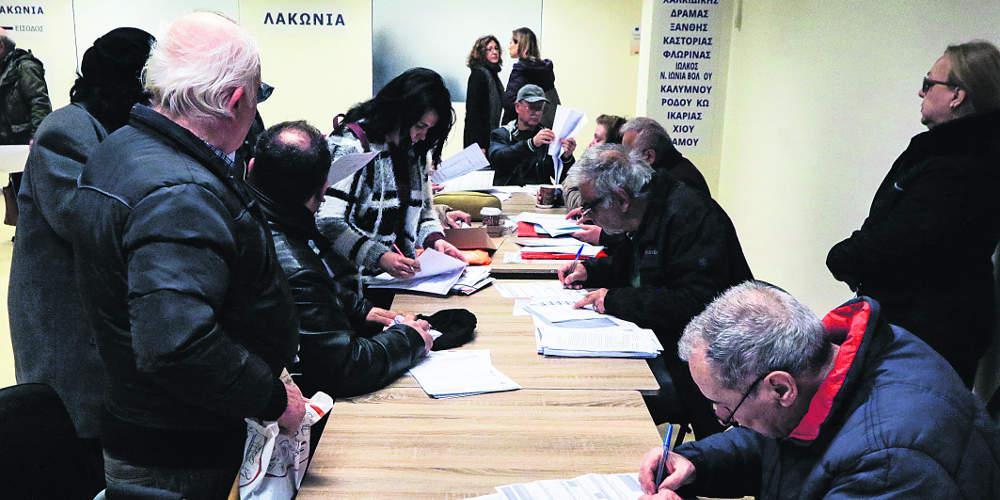Μαραθώνια ήταν η συνεδρίαση του Eurogroup που διήρκεσε περίπου 11 ώρες.
Συμφωνία για την εκταμίευση των 10,3 δισ. ευρώ τμηματικά ανακοίνωσε ο πρόεδρος του Eurogroup Γερούν Ντάισελμπλουμ, μετά το τέλος της συνεδρίασης του Eurogroup.
Στο ζήτημα του χρέους σημείωσε πως υπήρχε επίσης συμφωνία στα βραχυπροθεσμα και μεσοπρόθεσμα μέτρα, αλλά και σ’ ένα μηχανισμό μακροπρόθεσμου χαρακτήρα.
Ειδικότερα, ο Γερούν Ντάισελμπλουμ έκανε λόγο για «πλήρη συμφωνία», στη συνέντευξη Τύπου, μετά από τη συνεδρίαση, η οποία ξεκίνησε λίγο μετά από τις 3 τα ξημερώματα της Τετάρτης.
Ο επικεφαλής του Eurogroup ανακοίνωσε ότι θα εκταμιευθεί η δόση των 10,3 δισ. ευρώ προς την Ελλάδα, αλλά σε υποδόσεις.
«Αυτά είναι καλά νέα, η Ελλάδα έχει κάνει αρκετή δουλειά», σημείωσε, αλλά πρόσθεσε ότι οι θεσμοί θα κάνουν έναν τελικό έλεγχο για να δουν αν ικανοποιούνται 100% οι δεσμεύσεις για τις μεταρρυθμίσεις.
«Αυτό θα πρέπει να οδηγήσει σε πλήρη και θετική κατάληξη της πρώτης αξιολόγησης», δήλωσε χαρακτηριστικά.
Αναλυτικά οι δηλώσεις του:
«Το κύριο ζήτημα ήταν αυτό της Ελλάδος. Έχουμε πλήρη συμφωνία θεσμών – Ελλάδας κ αυτό ήταν καλοδεχούμενο. Σχετικά με πακέτο μεταρρυθμίσεων έχουμε πλήρη συμφωνία. Υπάρχει ο και ο μηχανισμός έκτακτης ανάγκης. ο ESM θα μπορέσει να υποστηρίξει το επιπλέον μνημόνιο και να μιλήσουμε για τα 3,3 δισεκατομμύρια
Μετά τη σημερινή συμφωνία το πρόγραμμα είναι καλύτερο.Η Ελλάδα έχει κάνει πάρα πολλά γιας να προχωρήσει προς τα εμπρός. Φυσικά αυτό θα πρέπει να οδηγήσει σε μια θετική ολοκλήρωση της αξιολόγησης. Είχαμε υποσχεθεί ότι θα συζητήσουμε για το χρέος. Θέλαμε να έχουμε το 15% και στο μέλον όταν το χρέος έχει κατέβει να έχουμε το 20%. Σχεδιάσαμε και συμφωνήσαμε απόψε σε μια σειρά μέτρων που μπορεί να ληφθούν βραχυπρόθεσμα και μια σειρά μέτρων για μεσοπρόθεσμα αν αυτά χρειαστούν. Έχουμε και μια σειρά μέτρων για μακροπρόθεσμα.
Επιπλέον υπάρχει επιπλέον μηχανισμός για μακροπρόθεσμα μέτρα. Το βραχυπρόθεσμο είναι διαχείριση χρέους, άρα για θέματα που σχετίζονται με τη μείωση ων κινδύνων των επιτοκίων. Θα υπάρχει και ένα waver. Είναι δύσκολο να πούμε ποιος θα είναι ο οικονομικός αντίκτυπος. Το μεσοπρόθεσμο: Θα τα ξαναδούμε στα μέσα το 2018. Αν ολοκληρωθεί επιτυχώς το πρόγραμμα, θα κάνουμε περισσότερα. Θα δούμε το πρόγραμμα από το 2018 και μετά.
Επιπλέον μιλήσαμε για το εξής. Αν θυμάστε στο προηγούμενο πρόγραμμα είχαμε συμφωνήσει να επιστρέψουμε ένα κομμάτι των κερδών στην Ελλάδα. Το 2014 η προσπάθεια ανεκόπη αλλά αυτό το ποσό θα είναι διαθέσιμο από το 2017 και εμείς θα επανακινήσουμε αυτή τη διαδικασία. Τρίτο στοιχείο σε αυτό το πακέτο είναι η διαχείριση των υποχρεώσεων και εμείς θα δούμε τα δάνεια προς την Ελλάδα και πώς μπορούμε να αξιοποιήσουμε νέους πόρους προς τον ESM. Υπάρχουν 20 δις. Ευρώ που δεν έχουν χρησιμοποιηθεί ως τώρα.
Πέραν τούτου θα δούμε και για τους μελλοντικούς κινδύνους και ένα κομμάτι θα μπορούσε να χρησιμοποιηθεί για το επίσημο χρέος. Το ΕΤΧΣ θα μπορέσει να κάνει κάποια σχέδια και να δει πως θα γίνουν οι αποσβέσεις στο μέλλον. Επιπλέον μιλήσαμε για ένα μηχανισμό που αν χρειαστεί θα μπορεί να λάβει επιπλέον μέτρα για το χρέος. Πρέπει να διασφαλίσουμε πως θα έχουμε περισσότερο χρόνο. Θα πρέπει η Ελλάδα να συμμορφωθεί με το πλαίσιο των δικών μας δημοσιονομικών κανονισμών.
Κατόπιν τούτων το σημείο κλειδί είναι αν θα είναι το ΔΝΤ μαζί μας. Είμαι στην ευχάριστη θέση να σας πω ότι το Ταμείο έχει εκφράσει τη δική του πρόταση για να υπάρχει κάποια ρύθμιση ως το τέλος του έτους. Άρα το Ταμείο θα είναι ένα κομμάτι του προγράμματος στήριξης της Ελλάδας. Το Ταμείο θα πρέπει να έχει μια νέα πολιτική και να αξιολογεί την τρέχουσα κατάσταση στην Ελλάδα και κατόπιν τούτων το Ταμείο θα αξιολογήσει αυτά που αξιολογήσαμε εμείς απόψε.
Είναι σημεία κλειδιά που πρέπει να αξιολογηθούν από το Ταμείο. Η πιθανή ελάφρυνση του χρέους θα γίνει στο τέλος του προγράμματος. Ο σκοπός είναι η αναθεώρηση αυτού του μηχανισμού. Πρέπει να έχουμε στο μυαλό μας ότι η Ελλάδα θα παραμείνει εποπτεία στη δημοσιονομική της πολιτική. Ανυπομονούμε για την επιτυχή έκβαση της πρώτης αξιολόγησης. Είναι ένα σημείο καμπής στο ελληνικό πρόγραμμα. Η εμπιστοσύνη έχει αρχίσει να αποκαθίσταται.
Χωρίς αυτήν την εμπιστοσύνη θα ήταν πολύ δύσκολο. Θα ήθελα να ευχαριστήσω τον Έλληνα ΥΠΟΙΚ και τους συνεργάτες του γιατί εργάστηκαν πάρα πολύ για να φτάσουμε σε αυτό το επίπεδο».
Τόμσεν: Όλοι αναγνωρίζουν ότι το ελληνικό χρέος δεν είναι βιώσιμο
Την ικανοποίηση του Διεθνούς Νομισματικού Ταμείου για το γεγονός ότι πλέον όλοι αναγνωρίζουν ότι το ελληνικό χρέος δεν είναι βιώσιμο, εξέφρασε ο Πόουλ Τόμσεν, επικεφαλής του ευρωπαϊκού τμήματος του ΔΝΤ, μετά το πέρας της συνεδρίασης του Eurogroup.
“Όλοι δέχονται πως η Ελλάδα χρειάζεται ελάφρυνση του χρέους της και πως δεν μπορεί να το καταστήσει βιώσιμο μόνο με τις δικές της προσπάθειες”, υπογράμμισε ο Π. Τόμσεν, συμπληρώνοντας ότι το ΔΝΤ έδειξε “ευελιξία”.
Άτυπη ενημέρωση από την κυβέρνηση
Στο Eurogroup υπήρξαν σημαντικές αποφάσεις.
1. Η αξιολόγηση ολοκληρώθηκε και θα υπάρξει εκταμίευση συνολικού ύψους 10,3 δισ. ευρώ σε δύο τμήματα. Τα 7,5 δισ. τον Ιούνιο και τα υπόλοιπα 2,8 δισ. ευρώ τον Σεπτέμβριο.
2. Ουσιαστικά δίνονται για τα ληξιπρόθεσμα χρέη του δημοσίου 3,5 δισ. ευρώ, περίπου 700.000 ευρώ το μήνα μέχρι και τον Οκτώβριο του 2016. Δηλαδή 5 μήνες Χ 700.000=3,5 δισ. ευρώ θα “πέσουν” στην αγορά.
3. Συμφωνήθηκε ότι η Ελλάδα δεν θα πληρώνει πάνω από το 15% για τόκους και χρεολύσια [GDP] το μεσοπρόθεσμο χρονικό διάστημα. Στη συνέχεια ο περιορισμός αυξάνεται στο 20% του GDP. Το ποσοστό αυτό, στο οποίο θα περιλαμβάνονται και τα έντοκα γραμμάτια, είναι χαμηλό με βάση όλους τους συγκριτικούς δείκτες για χώρες με ανάλογα οικονομικά χαρακτηριστικά. Και μειώνει αποφασιστικά τις χρηματοδοτικές ανάγκες της χώρας για τα επόμενα χρόνια.
4. Ρυθμίζεται άμεσα, από αύριο, το θέμα του χρέους.
– Τα συγκεκριμένα μέτρα [βραχυπρόθεσμα, μεσοπρόθεσμα και μακροπρόθεσμα] για την ρύθμιση του χρέους δημιουργούν ένα σαφή οδικό χάρτη που εξομαλύνει τις συνθήκες ρευστότητας στην οικονομία.
– Είκοσι δισ. ευρώ που περίσσεψαν από την ανακεφαλαιοποίηση των τραπεζών χαρακτηρίζονται ως “διαθέσιμα” για πράξεις επαναγοράς του χρέους.
– Οι συμφωνηθείσες παρεμβάσεις για το χρέος επιτυγχάνουν την έξοδο στις αγορές, μέσω της τόνωσης της επενδυτικής εμπιστοσύνης και της εξάλειψης των συνθηκών αβεβαιότητας στην οικονομία.
– Η συμφωνία εξασφάλισης της βιωσιμότητας του χρέους είναι προσαρμοσμένη στα ιδιαίτερα χαρακτηριστικά της ελληνικής οικονομίας. Και εξασφαλίζει, για μακρύ χρονικό διάστημα, την χρηματοδότηση της οικονομίας, υπό πολύ ευνοϊκούς όρους.
Σαπέν: Υπήρξε συμφωνία σε όλα τα θέματα για την Ελλάδα
«Υπήρξε συμφωνία σε όλα τα θέματα που συζητήθηκαν για την Ελλάδα», δήλωσε ο Γάλλος υπουργός Οικονομικών Μισέλ Σαπέν, λίγα λεπτά μετά από την ολοκλήρωση του Eurogroup. Ο ίδιος δήλωσε ακόμη ότι το ΔΝΤ είναι μέρος της συμφωνίας, που καλύπτει βραχυπρόθεσμη, μεσοπρόθεσμη και μακροπρόθεσμη ελάφρυνση χρέους.
Πληροφορίες κάνουν λόγο για «ματς» μεταξύ ΔΝΤ και Γερμανίας, με πολλά τάιμ άουτ κατά τη διάρκεια του Eurogroup.
Το πληρες κείμενο του Eurogroup στα αγγλικά:
The Eurogroup welcomes that a full staff-level agreement has been reached between Greece and the institutions. Also, the Eurogroup notes with satisfaction that the Greek authorities and the European institutions have reached an agreement on the contingency fiscal mechanism, which is in line with the Eurogroup statement adopted on 9 May in particular as regard the possible adoption of permanent structural measures, including revenue measures, to be agreed with the institutions. It therefore provides further reassurances that Greece will meet the primary surplus targets of the ESM programme (3.5% of GDP in the medium-term), without prejudice to the obligations of Greece under the SGP and the Fiscal Compact.
The Eurogroup also welcomes the adoption by the Greek parliament of most of the agreed prior actions for the first review, notably the adoption of legislation to deliver fiscal parametric measures amounting to 3% of GDP that should allow to meet the fiscal targets in 2018, to open up the market for the sale of loans and to establish the agreed Greek Privatisation and Investment Fund that should operate in full independence. The Eurogroup mandates the EWG to verify in the next few days the full implementation of the outstanding prior actions on the basis of an assessment by the institutions, in particular the corrections to the legislation on the opening up of the market for the sale of loans, and on the pension reform, as well as the completion of all prior actions related to the government pending actions in the field of privatization.
Following the full implementation of all prior actions and subject to the completion of national procedures, the ESM governing bodies are expected to endorse the supplemental MoU and approve the disbursement of the second tranche of the ESM programme. The second tranche under the ESM programme amounting to EUR 10.3 bn will be disbursed to Greece in several disbursements, starting with a first disbursement in June (EUR 7.5 bn) to cover debt servicing needs and to allow a clearance of an initial part of arrears as a means to support the real economy. The subsequent disbursements to be used for arrears clearance and further debt servicing needs will be made after the summer. The disbursements for arrears clearance will be subject to a positive reporting by the European Institutions on the clearance of net arrears. The additional disbursement for debt servicing needs will be subject to milestones related to privatization, including the new Privatization and Investment Fund, bank governance, revenue agency and energy sector to be assessed by the European institutions and verified by the EWG and the ESM Board of Directors.
In line with the 9 May Eurogroup statement, and in view of the forthcoming full implementation of all the prior actions by Greece and completion of the first review, the Eurogroup considered today the sustainability of Greek public debt.
The Eurogroup agrees to assess debt sustainability with reference to the following benchmark for gross financing needs (GFN): under the baseline scenario, GFN should remain below 15% of GDP during the post programme period for the medium term, and below 20% of GDP thereafter.
The Eurogroup recalls the medium-term primary surplus target of 3.5% of GDP as of 2018 and underlines the importance of a fiscal trajectory consistent with the fiscal commitments under the EU framework.
The Eurogroup recalls the following general guiding principles agreed on 9 May for possible additional debt measures: (i) facilitating market access in order to replace over time public financed debt with privately financed debt; (ii) smoothening the repayment profile; (iii) incentivising the country’s adjustment process even after the programme ends; and (iv) flexibility to accommodate uncertain GDP growth and interest rate developments in the future. On 9 May the Eurogroup also reconfirmed that nominal haircuts are excluded, and that all measures taken will be in line with existing EU law and the ESM and EFSF legal frameworks.
Guided by these principles and on the basis of technical work carried out by the EWG, the Eurogroup agreed today on a package of debt measures which will be phased in progressively, as necessary to meet the agreed benchmark on gross financing needs and will be subject to the pre-defined conditionality of the ESM programme.
For the short-term, the Eurogroup agrees on a first set of measures which will be implemented after the closure of the first review up to the end of the programme and which includes:
Smoothening the EFSF repayment profile under the current weighted average maturity
Use EFSF/ESM diversified funding strategy to reduce interest rate risk without incurring any additional costs for former programme countries
Waiver of the step-up interest rate margin related to the debt buy-back tranche of the 2nd Greek programme for the year 2017
The Eurogroup asks the EFSF and ESM management to take these measures forward within their mandate, on the basis of preparatory work by the EWG, and where needed to prepare formal decision making by the relevant EFSF and ESM decision-making bodies. The decision on the smoothening of the EFSF repayment profile and the reduction of interest rate risks should be taken as a matter of priority.
For the medium term, the Eurogroup expects to implement a possible second set of measures following the successful implementation of the ESM programme. These measures will be implemented if an update of the debt sustainability analysis produced by the institutions at the end of the programme shows they are needed to meet the agreed GFN benchmark, subject to a positive assessment from the institutions and the Eurogroup on programme implementation.
Abolish the step-up interest rate margin related to the debt buy-back tranche of the 2nd Greek programme as of 2018
Use of 2014 SMP profits from the ESM segregated account and the restoration of the transfer of ANFA and SMP profits to Greece (as of budget year 2017) to the ESM segregated account as an ESM internal buffer to reduce future gross financing needs.
Liability management – early partial repayment of existing official loans to Greece by utilizing unused resources within the ESM programme to reduce interest rate costs and to extend maturities.
If necessary, some targeted EFSF reprofiling (e.g. extension of the weighted average maturities, re-profiling of the EFSF amortization as well as capping and deferral of interest payments) to the extent needed to keep GFN under the agreed benchmark in order to give comfort to the IMF and without incurring any additional costs for former programme countries or to the EFSF.
For the long-term, the Eurogroup is confident that the implementation of this agreement on the main features for debt measures, together with a successful implementation of the Greek ESM programme and the fulfilment of the primary surplus targets as mentioned above, will bring Greece’s public debt back on a sustainable path over the medium to long run and will facilitate a gradual return to market financing. At the same time, the Eurogroup agrees on a contingency mechanism on debt which would be activated after the ESM programme to ensure debt sustainability in the long run in case a more adverse scenario were to materialize. The Eurogroup would consider the activation of the mechanism provided additional debt measures are needed to meet the GFN benchmark defined above and would be subject to a decision by the Eurogroup confirming that Greece complies with the requirements under the SGP. Such mechanism could entail measures such as a further EFSF reprofiling and capping and deferral of interest payments. Also, the Eurogroup commits to long-term technical assistance to boost Greek growth.
The Eurogroup recognises that over the exceptionally long time horizon of assessing debt sustainability there can be no forecasts, only assumptions, given the sizable degree of uncertainty over macroeconomic developments.
Against the background of the forthcoming successful completion of the first review and the agreement on debt relief, the Eurogroup welcomes the intention of the IMF management to recommend to the Fund’s Executive Board to approve a financial arrangement before the end of 2016 that will support the implementation of the agreed fiscal and structural reforms. It is recognised that, consistent with IMF policies, approval of this arrangement will also be based on a new DSA and the assessment of possible debt relief measures mentioned above. The possible debt relief will be delivered at the end of the programme in mid-2018 and the scope will be determined by the Eurogroup on the basis of a revised DSA in cooperation with the European Institutions for purposes of taking into account the European policy framework, subject to full implementation of the programme.
The Eurogroup stands ready, in line with usual practice, to support the completion of future reviews provided that the policy package considered today, including the contingency mechanism, is implemented as planned. The Eurogroup confirms that programme implementation, as well as policy conditionality and targets, will be reviewed regularly based on input from the institutions.



























































